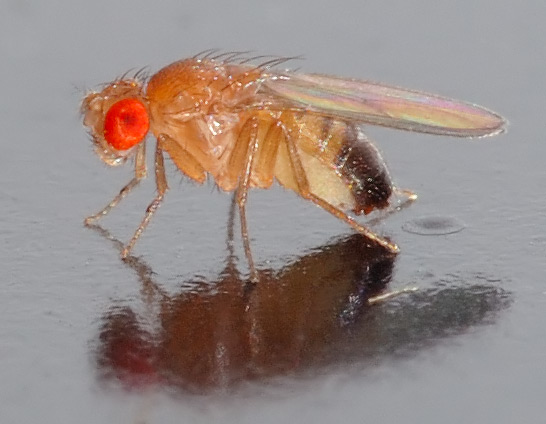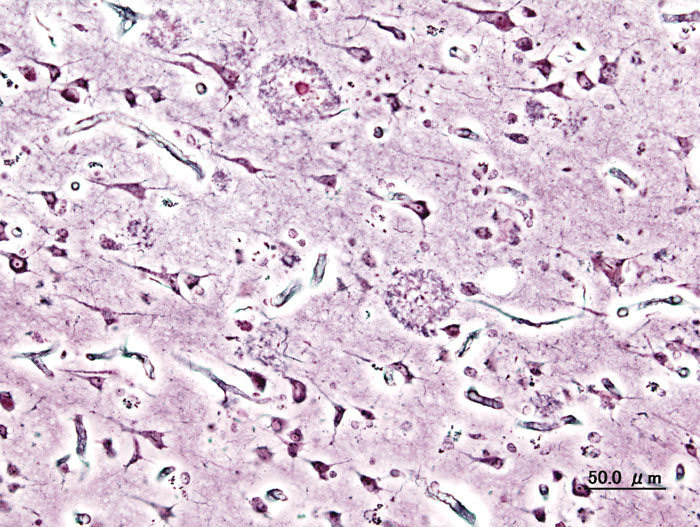Preventing Alzheimers Disease in Fruit Flies
Interview with
Kat - Also in the news this week, scientists have discovered a new molecule that can block the build up in the brain of beta amyloid. This is the toxic protein that causes Alzheimer's disease. But rather than working on human subjects, Dr. Leila Luheshi who's based at the Genetics Department here at the University of Cambridge made a discovery using fruit flies that were genetically engineered to develop the insect equivalent of Alzheimer's disease. Meera Senthilingam went along to meet her to find out more.
Leila - So it turns out that if you would like to study Alzheimers disease really you  need to have some sort of model of the disease in your own organism other than humans which you can try out new treatments on, and you can test new and rather crazy ideas. It turns out Drosophila are very good for this. They have quite complicated brains, a lot of the same genes that there are in humans and also, they have very short lifespans, so we can test lots of different treatments very rapidly in them. It turns out that we can give them something like Alzheimer's disease and then go out, and try and find different ways of curing it.
need to have some sort of model of the disease in your own organism other than humans which you can try out new treatments on, and you can test new and rather crazy ideas. It turns out Drosophila are very good for this. They have quite complicated brains, a lot of the same genes that there are in humans and also, they have very short lifespans, so we can test lots of different treatments very rapidly in them. It turns out that we can give them something like Alzheimer's disease and then go out, and try and find different ways of curing it.
Meera - So how do you set about giving them Alzheimer's disease?
Liela - So we take the gene that encodes for the protein that seems to be important in causing Alzheimer's disease in humans, and we introduce it into our fruit flies. Then, when that gene is expressed in the brain this protein, which is called amyloid, clumps together in the brains of our fruit flies, just like it does in the brains of humans with Alzheimer's disease. Then the fruit fly's brain starts to degenerate, and we can see that they can't move properly, they die much sooner, and their memory is impaired as well, just like people with Alzheimer's disease.
Meera - So, is it the case where all people that have the gene will develop Alzheimer's?
Leila - No. Actually, the amyloid protein that damages the brain in Alzheimer's disease is present in all of us. But under normal circumstances, it's present in small enough quantities, and in a form which doesn't seem to cause us any problems. In fact, what seems to happen in most patients with Alzheimer's disease that you produce a little bit more maybe of a slightly stickier than usual version of this protein. That starts to stick together in the brain, and then that starts the damage of the neurons.
Meera - So having given these flies Alzheimer's, you've set about finding a new molecule that should hopefully treat Alzheimer's in these flies, and hopefully in humans?
 Leila - Yes. So what we thought was, well, if we know there's a protein, this protein called amyloid, which clumps together in the brains, then if we can prevent this protein from clumping together, then hopefully the cells in the brain won't die anymore. And so, what our colleagues in Sweden did was they designed a new molecule which is called an affibody which binds to the amyloid protein that is important in Alzheimer's disease, and prevents it from clumping together. They first tested this in a test tube and they found this was very effective, and then they came to us and said, "Well, can you test this in your fruit fly model of Alzheimer's disease?" When we put this new molecule, this affibody, into the brains of our fruit flies with Alzheimer's, we found that essentially, the fruit flies were cured of the Alzheimer's disease, and in fact the protein which clumps together, this amyloid protein, was now completely cleared from the brain.
Leila - Yes. So what we thought was, well, if we know there's a protein, this protein called amyloid, which clumps together in the brains, then if we can prevent this protein from clumping together, then hopefully the cells in the brain won't die anymore. And so, what our colleagues in Sweden did was they designed a new molecule which is called an affibody which binds to the amyloid protein that is important in Alzheimer's disease, and prevents it from clumping together. They first tested this in a test tube and they found this was very effective, and then they came to us and said, "Well, can you test this in your fruit fly model of Alzheimer's disease?" When we put this new molecule, this affibody, into the brains of our fruit flies with Alzheimer's, we found that essentially, the fruit flies were cured of the Alzheimer's disease, and in fact the protein which clumps together, this amyloid protein, was now completely cleared from the brain.
Meera - How was this affibody created?
Leila - It's based on a protein that is found naturally inside bacteria. What our colleagues in Sweden did was they made mutations in this protein, then they screened thousands, in fact, millions of different mutations in this protein until they found a mutant form of this protein that bound very specifically to the amyloid protein that's important in Alzheimer's disease.
Meera - And how did you set about putting this affibody into the Drosophila then as well?
Leila - So we essentially did the same thing that we did to make our model of Alzheimer's disease in the first place. We made a gene for this affibody protein and we put the gene into the brain of our fruit fly, and then that gene expresses the affibody protein, so then we have one fruit fly that expresses the affibody, one fruit fly that has Alzheimer's disease, and when we breed those two fruit flies together their offspring, their children, have both proteins. They have the Alzheimer's related protein and they also have the affibody, and then we could see that when you have those two proteins together, the flies didn't get Alzheimer's disease anymore.
Meera - So, its' not the case where the fly had Alzheimer's and then you gave it this protein, and it actually treated the Alzheimer's that it had previously?
Leila - No. So right now, we have to do it with both proteins there from the beginning together so we prevent the amyloid protein that's important in Alzheimer's disease from ever clumping together. But what we would like to do in the future is to make our flies so that they actually develop Alzheimer's disease, so we let the protein stick together in the brains of the flies, and then put in affibody protein afterwards, and see if we can either help the symptoms or reverse them. But we haven't done that experiment yet. First of all, we have to go through some more tests in slightly more complicated models of Alzheimer's disease in our fruit fly to see if this kind of protein - for instance, if we inject it into the bloodstream, can even get into the brain? It's got to be able to get to the brain, really, to have any effect. So, we're still somewhere off seeing whether this kind of therapy would ever work in humans, but at least in principle, we know that if we can clear this amyloid protein from the brain that it might help the Alzheimer's patients. Assuming we get to them early enough in their disease.
Kat - That was Leila Luheshi from the University of Cambridge, talking to Meera Senthilingam there about a work she's just published in the journal PLoS Biology.
- Previous How the Heart got its Arteries
- Next Farming in a Changing Climate










Comments
Add a comment